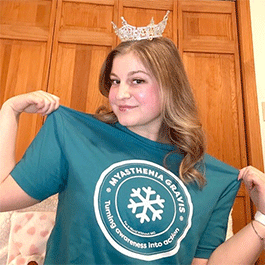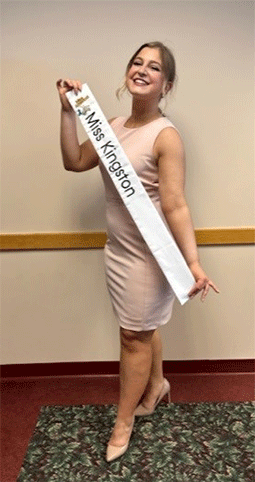 Audrey Getman is a graduate student at the University of New Hampshire and, since being diagnosed with MG in 2020, has made sharing her experiences with the disease a big part of her life. She started competing in the Miss America program in 2019 and has held the titles of Miss Gate City, Miss Goffstown, and (currently) Miss Kingston.
Audrey Getman is a graduate student at the University of New Hampshire and, since being diagnosed with MG in 2020, has made sharing her experiences with the disease a big part of her life. She started competing in the Miss America program in 2019 and has held the titles of Miss Gate City, Miss Goffstown, and (currently) Miss Kingston.
Tell us about your journey with MG so far. When were you diagnosed? What has it been like for you?
I was diagnosed in September of 2020. I was 23 years old, almost 24. It was mid-pandemic, which was already scary in general, and then to be diagnosed with an autoimmune disease in the middle of that was also scary.
It came on gradually – I started noticing some facial weakness and then I couldn’t use my mouth. My eyes wouldn’t close all the way (the opposite of most MG patients, so I definitely confused a few neurologists with that one!). I went to the ER because I thought I was having a stroke or an aneurysm. They did an MRI – nope, no stroke or aneurysm – and then the ER doctor came back and told me, “I had to go look this up because I couldn’t remember the name, but I think it’s myasthenia gravis.”
I went to a neurologist the next morning for a follow up, where they performed the standard antibody blood test panel, which all came back negative. I was then referred to Massachusetts General Hospital, where I was diagnosed with a single fiber EMG test, which led to an initial diagnosis of double seronegative myasthenia gravis. They retested my blood, though, and ended up finding AChR antibodies. They also discovered that I had an enlarged thymus. I had a thymectomy in December 2020, and that has helped a lot. It’s been a journey with the prednisone, but as of today, I don’t feel like the disease limits me the way it used to. I know my limits, but I’m able to push the boundaries of those limits. I’ve gotten into fitness and weightlifting, ironically!
 One of the hardest parts of my diagnosis was how it affected my ability to sing and perform. I’m a lifelong singer, so muscle weakness that affected my voice was pretty devastating initially. I was already involved with the Miss American Organization, so MG impacted my ability to perform for a while. But now I’m able to raise awareness about MG with the local titles I’ve been able to earn, and bring myasthenia gravis to the state stage in New Hampshire, with the goal of bringing it to the national stage. My work in raising awareness has definitely helped more people in my community understand what myasthenia gravis is.
One of the hardest parts of my diagnosis was how it affected my ability to sing and perform. I’m a lifelong singer, so muscle weakness that affected my voice was pretty devastating initially. I was already involved with the Miss American Organization, so MG impacted my ability to perform for a while. But now I’m able to raise awareness about MG with the local titles I’ve been able to earn, and bring myasthenia gravis to the state stage in New Hampshire, with the goal of bringing it to the national stage. My work in raising awareness has definitely helped more people in my community understand what myasthenia gravis is.
Why is it important to you to raise awareness?
I thought I was otherwise healthy, and then my world completely turned upside down. This could happen to anybody. I also think it’s important for safety reasons to share what symptoms look like – someone could have a crisis, and the more people know about MG, the more people can recognize the signs and provide help.
One of the most important things to me, however, is sharing my adversity. This is what I’m challenged with every single day. I hope by telling my story I can help others get through any challenges they may face.
What do you wish others knew about having MG?
A lot of times it’s an invisible illness. I’m dealing with something that others can’t usually see. I can feel facial weakness, for instance, before others can see it. I encourage others to be empathetic — you don’t know what someone may be going through.
How has the MGFA helped you navigate your journey with this disease?
The MGFA has definitely helped my journey, especially when I was first diagnosed. I was able to find a lot of resources from the MGFA that provided me with the knowledge and support I needed. I also joined the MAYA meetings (when I was able to), and it was helpful to talk to people who got it, even if it was just for an hour or so.
What advice would you give to others who are newly diagnosed?
The best piece of advice I can give is to not let MG define you, but let it push you and motivate you. Know your limits, be safe, but don’t let MG control your entire life.

